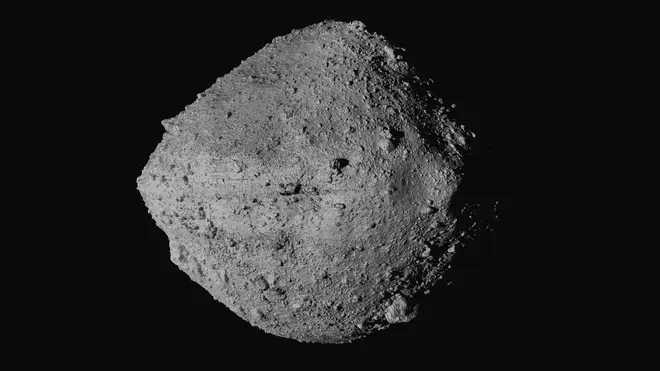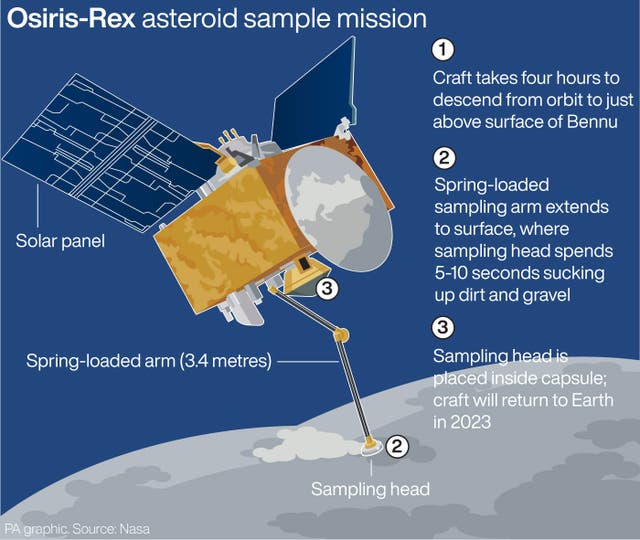
Richard Spurr 1am - 4am
21 October 2020, 10:14

The Osiris-Rex spacecraft sent back confirmation of its contact with asteroid Bennu more than 200 million miles away.
A Nasa spacecraft has descended to an asteroid and, dodging boulders the size of buildings, momentarily touched the surface to collect a handful of cosmic rubble for return to Earth.
It was a first for the United States – only Japan has collected asteroid samples.
“I can’t believe we actually pulled this off,” said lead scientist Dante Lauretta, from the University of Arizona.
“The spacecraft did everything it was supposed to do.”
The Osiris-Rex spacecraft sent back confirmation of its contact with asteroid Bennu more than 200 million miles away, drawing cheers from the mission team.
But it could be a week before scientists know how much, if anything, was grabbed and whether another try will be needed.
If successful, Osiris-Rex will return the samples in 2023.
Following commands sent well in advance by ground controllers near Denver, the spacecraft took four-and-a-half hours to make its way down from its tight orbit around Bennu.
Bennu’s gravity was too low for Osiris-Rex to land – the asteroid is just 1,670ft (510 metres) across.
As a result, the spacecraft had to reach out with its 11ft (3.4-metre) robot arm and attempt to grab at least two ounces (60 grams) of Bennu.
The University of Arizona’s Heather Enos, deputy scientist for the mission, described it as “kissing the surface with a short touch-and-go measured in just seconds”.
At Mission Control for spacecraft builder Lockheed Martin, controllers on the Tag Team – for touch-and-go – wore royal blue polo shirts and black masks with the mission patch.

The coronavirus pandemic had resulted in a two-month delay.
Tuesday’s operation was considered the most harrowing part of the mission, which began with a launch from Cape Canaveral back in 2016.
A van-sized spacecraft with an Egyptian-inspired name, Osiris-Rex aimed for a spot equivalent to a few parking spaces on Earth in the middle of the asteroid’s Nightingale Crater.
After nearly two years orbiting Bennu, the spacecraft found this location to have the biggest patch of particles small enough to be swallowed up.
After determining that the coast was clear, Osiris-Rex closed in the final few yards for the sampling.
The spacecraft was programmed to shoot out pressurised nitrogen gas to stir up the surface, then suck up any loose pebbles or dust.

Contact was expected to last a mere five to 10 seconds, with the spacecraft quickly backing away.
By the time flight controllers heard back from Osiris-Rex, the action had already happened 18-and-a-half minutes earlier, the time it takes radio signals to travel each way between Bennu and Earth.
Scientists want between two ounces (60 grams) and four pounds (2kg) of Bennu’s black, crumbly, carbon-rich material – thought to contain the building blocks of our solar system.
Nasa’s science mission chief, Thomas Zurbuchen, likened Bennu to the Rosetta Stone: “Something that’s out there and tells the history of our entire Earth, of the solar system, during the last billions of years.”
Bennu has a slight chance of smacking Earth late in the next century, although not as a show-stopping life-ender.
The more scientists know about the paths and properties of potentially hazardous space rocks like this one, the safer we will all be.
Osiris-Rex can make up to three touch-and-go manoeuvres in case it comes up short.

Regardless of how many tries it takes, the samples will not return to Earth until 2023 to close out the 800-plus million dollar quest.
The sample capsule will parachute into the Utah desert.
“That will be another big day for us. But this is absolutely the major event of the mission right now,” Nasa scientist Lucy Lim said.
Japan expects samples from its second asteroid mission – in the milligrams at most – to land in the Australian desert in December.
Nasa, meanwhile, plans to launch three more asteroid missions in the next two years, all one-way trips.